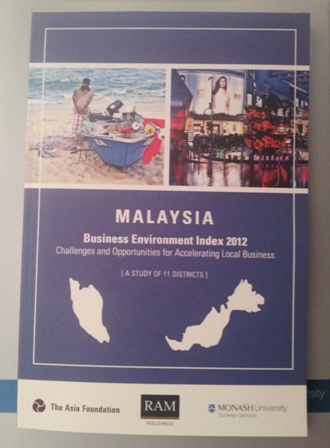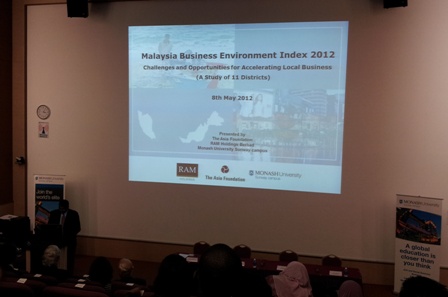
The BEI aims to inspire local authorities to improve their service delivery and develop actionable policy agendas that benefit local businesses. By ranking district scores, the BEI identifies the best performers by district and highlights practices and initiatives implemented by those high-performing districts as practical examples of attainable success that can be emulated in other districts.
According to the BEI pilot study, Kemaman in the state of Terengganu ranks the highest in business-friendliness followed by Sepang in the state of Selangor. Ampang Jaya ranks the lowest while Petaling Jaya ranks the second lowest, both are districts in state of Selangor.
Two out of Nine sub indices of BEI identified are:
i) PAYING INFORMAL CHARGES to government officials for service or privileges adds to the costs of running a business. That adds that public sector corruption is recognizes as both an impediment to doing business and a major obstacle of economic development.
ii) SECURITY and CRIME such as theft, robbery, vandalism and arson have a negative impact on business climate that “act like a tax on the entire economy”. The sub index reported that on average 13 percent of business across all districts experienced losses from crime last year, while nine percent felt it was necessary to pay protection money to local police.
The sub-indices that underlie the overall BEI 2012 indicate particular strengths and weaknesses within each district are:
1. Transparency and policy risk: A measure of the ease of accessing the proper government information or legal documents necessary to run a business, and of the extent to which new policies and laws are communicated to firms and predictably implemented.
2. Regulatory costs: A measure of the amount of time firms spend on bureaucratic compliance and waiting periods, as well as of the frequency and duration of inspections by local regulatory agencies.
3. Entry costs: A measure of the time it takes to register and receive licenses to start a business, the official costs of obtaining all licenses/permits, and the ease of obtaining those documents as perceived by businesses.
4. Informal charges: A measure of the prevalence of paying informal charges for firm level operations as well as of the fairness of the government procurement process.
5. Crime and security: A measure of the amount of financial loss a business experiences due to crime and the need to hire security services for protection.
6. Access to land and security of tenure: A measure of the formal rights to business premises and the perceived security of tenure once land is properly acquired.
7. Infrastructure and business development services: A measure of the availability of business development facilities and the availability and quality of infrastructure.
8. Pro-active government: A measure of the effectiveness of federal, state, and local government programmes and of businesses’ awareness of major proeconomic development programs initiated by the federal government.
9. Property rights and dispute resolution: A measure of confidence in both the legal system’s protection of property rights and in the fairness of dispute resolution.
Senior Lecturer at Monash University Sunway Campus, Jane L.Y. Terpstra Tong said the 11 districts were ranked in order of business-friendliness across nine areas of economic governance that are relevant to local economic growth in Malaysia, including entry costs, transparency, informal charges, property rights, and crime and security.
Designed by The Asia Foundation,“The Malaysia BEI tells us what is working and what is not,” said Anthea Mulakala, Country Representative for The Asia Foundation in Malaysia.
“This diagnostic tool identifies best practices and provides practical steps for success, which can be emulated by other districts. Across Asia, governments have embraced the Foundation’s indices as a sophisticated, empirical tool to measure local reform and business friendliness.”
For further information: MALAYSIA BUSINESS ENVIRONMENT INDEX 2012












